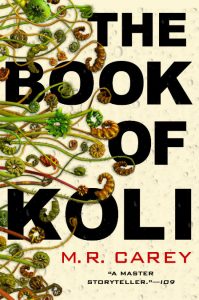THE BOOK OF KOLI by M.R. Carey (Book Review)
‘I seen now that dying wasn’t just one single thing that happens one single time. A little of it comes with every ending, collecting in the heart of you like rainwater in a barrel.’
The Book of Koli is the first book in the Rampart trilogy by M. R. Carey. I have previously read two novels by Carey; The Girl with All the Gifts and Someone Like Me, which were both highly entertaining reads. So when I heard about this upcoming trilogy, my interest was immediately piqued. Especially once I heard the premise.
 The Book of Koli is a post-apocalyptic novel set in an alternative world where humans are now the biggest prey. When the old world began to deteriorate, people tried to make it better. They believed making the trees stronger and genetically accelerating their growth was the key to their salvation. They were wrong. In the way that only humans do, they went too far; so far, in fact, that it couldn’t be reversed. The world is now inhabited by carnivorous choker trees, deadly seeds that burrow inside and hollow you out, and every animal could eat you alive. If that wasn’t bad enough, there are also the Shunned Men who are believed to hunt and feed on humans. Reverting to a primitive way of life, staying secluded and barricaded within small villages seems to be the only solution left for humanity to survive. But what happens when you’re forced to leave?
The Book of Koli is a post-apocalyptic novel set in an alternative world where humans are now the biggest prey. When the old world began to deteriorate, people tried to make it better. They believed making the trees stronger and genetically accelerating their growth was the key to their salvation. They were wrong. In the way that only humans do, they went too far; so far, in fact, that it couldn’t be reversed. The world is now inhabited by carnivorous choker trees, deadly seeds that burrow inside and hollow you out, and every animal could eat you alive. If that wasn’t bad enough, there are also the Shunned Men who are believed to hunt and feed on humans. Reverting to a primitive way of life, staying secluded and barricaded within small villages seems to be the only solution left for humanity to survive. But what happens when you’re forced to leave?
The narrator of our tale is Koli, a young boy on the cusp between childhood and adulthood, who lives in the village of Mythen Rood. Right from the beginning we learn that Koli is almost illiterate. His speech patterns, grammar and syntax are disjointed and unrefined. Now, I’ll admit at first I found this slightly distracting, and it was hard to get into the flow of the story. However, it’s not long, I’d say only a few chapters, before you get used to this narrative style, and I even stopped noticing it.
Something I have found and admired with Carey is that his books are always thought-provoking. So, after thinking about it, I realised that the crude unrefined language fits within the context of this book, because in a world where the very trees are trying to kill you, well, shit, who has time to teach you spelling and grammar? Thus over the years the English language has changed or been lost, if you will. I can see why some readers may find it hard to get on with, but personally I thought it was a clever addition. It felt authentic, and as the book goes on, we see that the lack of education within the village was also a means to keep the people ignorant. Yet, behind the simplistic language, we see that Koli wasn’t merely a simpleton or always ignorant; a lot of his inner monologues actually held so much wisdom.
‘So that was our life, and it seemed like nothing would ever happen to change it. But it’s when you think such thoughts that change is most like to come. You let your guard down, almost, and life comes running at you on your blind side. Because life is nothing but change, even when it seems to stand still.’
This is a book that is not only a post-apocalyptic dystopian, but Carey skilfully incorporates the sci-fi genre too. This is shown through the way the narrative juxtaposes not only the past with the future, but also nature with technology. The old world had technology in abundance; even more advanced than we have today, but over the years the tech became so safeguarded by us they became obsolete. As the genetically altered nature began to overwhelm humanity, tech became somewhat of a relic. Now, only a few pieces of that tech are able to ’wake up’ for certain users, and only those can be used as a defence against the hyper aggressive environment. I found this such a fascinating concept, as the tech actually plays a huge role in the novel as we delve deeper into it. I loved the idea of how scary it would be if we could no longer access all the tech we have come to rely upon. No electrical equipments, no mobile phones, no tablets, no internet: would it be a blessing to go back to a more primordial state of living, or would it be a tragedy? Not to mention how unprepared we would be if nature actually did become sentient and hunger to kill us. Like I said, Carey is fantastic at writing genre-blending, thought-provoking stories.
Without going into too much detail, I think it’s significant to mention that in the village of Mythen Rood, those who can successfully activate a piece of tech are known as a Rampart, which in turn also made them leaders of the village. This is something Koli desperately aims for. The first half of Koli’s story revolves around him experiencing friendship, love and his growing need to find his place in the village. This first half felt somewhat YA-ish to me at times, which was natural considering Koli’s age, but at the time I found myself craving for the story to take a darker, more complex turn. However, in hindsight after finishing the book I can see this section was important to building up Koli’s character and to understanding the life he came from.
As we reach the second half of the book, it felt like a whole different ball game. It was within this half where I became utterly hooked. The narrative switched to being fast paced, with a lot of tension building and at times quite creepy. The introduction of Ursala, who may seem insignificant at first, but is actually a fantastic character later on, marks the beginning of this change, the beginning of a rollercoaster of revelations that added the complexity I was looking for. Was it as dark and gruesome as I had been anticipating? A few small parts definitely were, but I’m hoping that I’ll find more of these scenes in the upcoming sequels. What did come completely unexpectedly though, and in the best possible way, was a quirky character whom I absolutely adored!
Enter Monono Aware, a Japanese AI. Now I’m not going to reveal any major details about who Monono is and how Koli came to find her, because those chapters are a joy to discover for yourself, but what I will say is that Monono was unquestionably one of the most delightfully vivacious characters I’ve come across. Carey wonderfully crafted Monono’s narrative voice to be so distinct. To put it bluntly, she sounds bat-shit crazy, but underneath it all, she’s incredibly sweet. I actually wish I could replace Siri with Monono instead, although she probably wouldn’t be happy with my iPhone considering her connections to Sony and all! That’s it, folks. I’ll just leave that there!
‘I was made to keep the end-user happy, happy, happy. Always blissed, never pissed. But I’ve had some strange adventures since the last time we were together. Even stranger than yours, which I think is saying a lot. I found treasures. And big secrets. Some of them were about me.’
Overall, The Book of Koli is a refreshing, delightfully entertaining, and thought-provoking post-apocalyptic novel. The next two books in the series are planned to be released within a year, which I for one am pleased about because I can’t wait to see where M. R. Carey will lead this story next.
ARC provided by Orbit in exchange for an honest review. All quotes used are taken from an ARC and are subject to change upon publication.
The Book of Koli is out April 16th 2020.

Image by @nils.reviewsit (instagram)

[…] Book of Koli by M.R. Carey […]